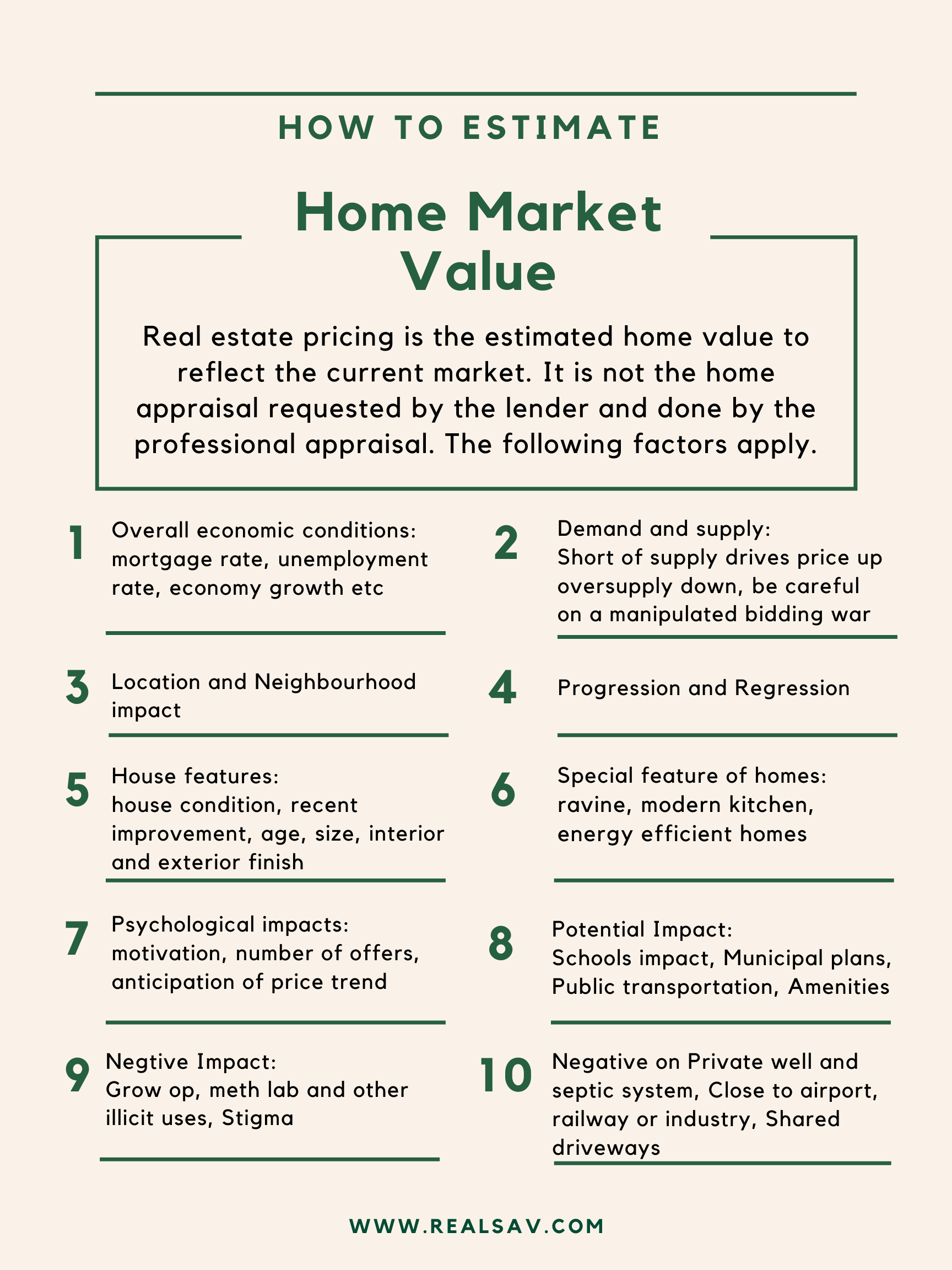Estimate a Home Value: All Factors Calculated
Estimate a home value vs home appraisal
- Realtors estimate a home value to reflect the current market. It is used for setting up the listing price or offer price during real estate transactions in Ontario, Canada. It is neither the appraisal requested by the lender nor done by the professional appraisals. It is not a property assessment value either.
- The home valuation is the opinion provided by the real estate realtor to help a home buyer or seller make an informed decision. It is commonly provided as CMA (competitive market analysis)
- Because both seller and buyer’s agents are trained in a similar way and follow the same principles, their recommendation for price for both the listing price and offer price may not vary much. Therefore, in many cases, the estimate for home value may be within a reasonable range from both parties’ angles.
- There are exceptions when a buyer or seller has an exceptional target or the seller’s strategy is to induce a bidding war.
Factors impacting home market value estimates
 Overall economic conditions
Overall economic conditions
Overall economic conditions such as mortgage rates, unemployment rates, economic growth, income change, government policies, and immigration policy, will affect the value of a property.
Supply and demand
The law of supply and demand drives the property price to an equilibrium. However, the temporary shortage of supply drives the price up and oversupply drives the price down. Setting a low price increases the demand and invites a bidding war, which may cause an irrational purchase.
Psychological impacts
The motivation of the seller and buyer, how many offers are registered, the anticipation of the house price trend all play roles in determining the market price. Sometimes, those factors act as an undesirable amplifier.
Location and Neighborhood impact
Home prices vary with different locations. In the same neighborhood, properties with a variety of building styles of the same quality are more appealing than a row of identical houses. Thus, they may have a higher value.
Progression and regression
- In a neighborhood with different types of houses, the presence of a superior property will have a positive impact on the value of an inferior property.
- Vice versa, the presence of an inferior property may decrease the value of the superior property.
House features
House condition, a recent improvement, age, size, interior, and exterior finish also trigger the difference in value.
The special feature of homes
- Some specific features may add value, such as ravines, modern kitchens, energy-efficient homes (greenhouses), and high-tech homes.
- Negative features include undesirable home conditions, on the main road, closeby highways or railway lines, nearby industrial and commercial areas, near a gas station, near towers, major hydro lines, etc
School Impact
- The benefit of a school close by is debatable. A family with school-age kids would consider a nearby school to be a plus, while others with no education demand may consider it unwelcome due to noise or traffic.
- The quality or reputation of the school may have a high impact on the parents who are looking for an esteemed public school. The convenience of kids' transportation is an apparent plus.
Municipal plans
Municipal plans for the neighborhood and surrounding areas may have a potential impact on property value.
Public transportation
Similarly, a buyer can consider the access to public transit convenient because of the frequent commute to work. Another buyer may think it unwelcome because of noise or traffic.
Amenities
Amenities could have either a positive or negative impact depending on the individual buyer.
Private well and septic system
May add extra cost and maintenance, thus negatively impacting the home value.
Grow op, meth lab, illicit uses, stigma
May have a substantially negative impact on home value.
Condo and townhouse special considerations
- The layout, corner location, and facings of the condo and townhouse may have an impact on home prices.
- The higher the condo floor, the price tends to be higher.
- The larger a condo is, the price per square foot tends to be lower.
- Maintenance fees rather than the value of the land will be considered in condo valuation.
Conclusion
- It is a general guideline on the factors impacting home value estimates. The actual selling or buying price may be largely skewed by the numbers of the offers, home sellers' and buyers’ circumstances, and their market expectations.
- Since late 2020, the red hot housing market in Canada presents a challenge to some traditional perspectives on the economic impact on house value as well.
 Overall economic conditions
Overall economic conditions